介词表时间用法
表时间的介词用法
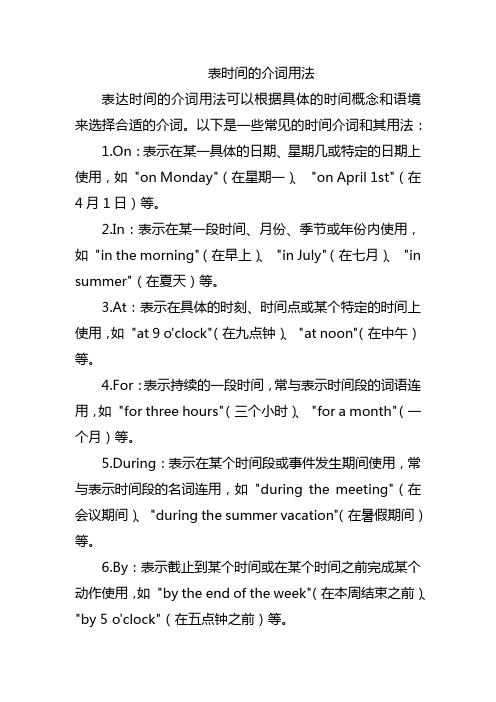
表时间的介词用法
表达时间的介词用法可以根据具体的时间概念和语境来选择合适的介词。
以下是一些常见的时间介词和其用法:
1.On:表示在某一具体的日期、星期几或特定的日期上使用,如"on Monday"(在星期一)、"on April 1st"(在4月1日)等。
2.In:表示在某一段时间、月份、季节或年份内使用,如"in the morning"(在早上)、"in July"(在七月)、"in summer"(在夏天)等。
3.At:表示在具体的时刻、时间点或某个特定的时间上使用,如"at 9 o'clock"(在九点钟)、"at noon"(在中午)等。
4.For:表示持续的一段时间,常与表示时间段的词语连用,如"for three hours"(三个小时)、"for a month"(一个月)等。
5.During:表示在某个时间段或事件发生期间使用,常与表示时间段的名词连用,如"during the meeting"(在会议期间)、"during the summer vacation"(在暑假期间)等。
6.By:表示截止到某个时间或在某个时间之前完成某个动作使用,如"by the end of the week"(在本周结束之前)、"by 5 o'clock"(在五点钟之前)等。
介词in和on在时间上的用法
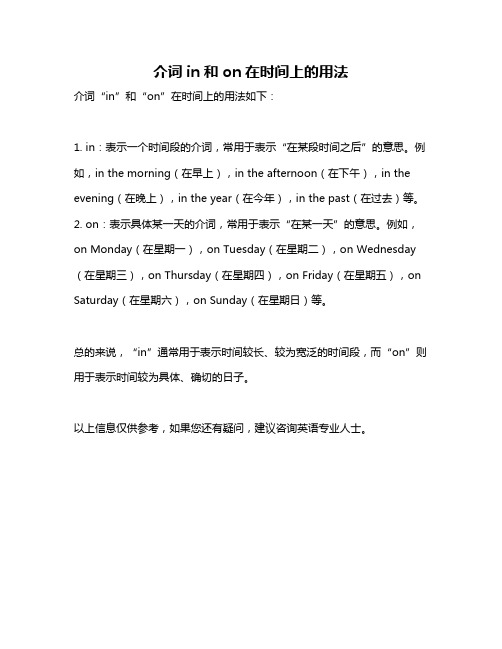
介词in和on在时间上的用法
介词“in”和“on”在时间上的用法如下:
1. in:表示一个时间段的介词,常用于表示“在某段时间之后”的意思。
例如,in the morning(在早上),in the afternoon(在下午),in the evening(在晚上),in the year(在今年),in the past(在过去)等。
2. on:表示具体某一天的介词,常用于表示“在某一天”的意思。
例如,on Monday(在星期一),on Tuesday(在星期二),on Wednesday (在星期三),on Thursday(在星期四),on Friday(在星期五),on Saturday(在星期六),on Sunday(在星期日)等。
总的来说,“in”通常用于表示时间较长、较为宽泛的时间段,而“on”则用于表示时间较为具体、确切的日子。
以上信息仅供参考,如果您还有疑问,建议咨询英语专业人士。
介 词 的 种 类 及 用 法(二):表示时间的介词(in、within;before、after;from、since)
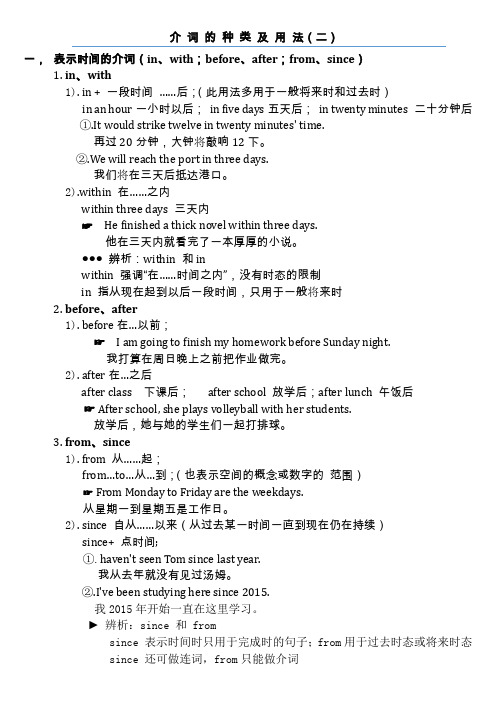
介词的种类及用法(二)一,表示时间的介词(in、with;before、after;from、since)1. in、with1). in + 一段时间……后;(此用法多用于一般将来时和过去时)in an hour一小时以后;in five days五天后;in twenty minutes 二十分钟后①.It would strike twelve in twenty minutes' time.再过20分钟,大钟将敲响12下。
②.We will reach the port in three days.我们将在三天后抵达港口。
2).within 在……之内within three days 三天内☞He finished a thick novel within three days.他在三天内就看完了一本厚厚的小说。
●●●辨析:within 和inwithin 强调“在……时间之内”,没有时态的限制in 指从现在起到以后一段时间,只用于一般将来时2. before、after1). before在…以前;☞I am going to finish my homework before Sunday night.我打算在周日晚上之前把作业做完。
2). after在…之后after class 下课后;after school 放学后;after lunch 午饭后☞After school, she plays volleyball with her students.放学后,她与她的学生们一起打排球。
3. from、since1). from 从……起;from…to…从…到;(也表示空间的概念或数字的范围)☞From Monday to Friday are the weekdays.从星期一到星期五是工作日。
2). since 自从……以来(从过去某一时间一直到现在仍在持续)since+ 点时间;①.haven't seen Tom since last year.我从去年就没有见过汤姆。
初中英语知识点归纳介词的表示时间与地点
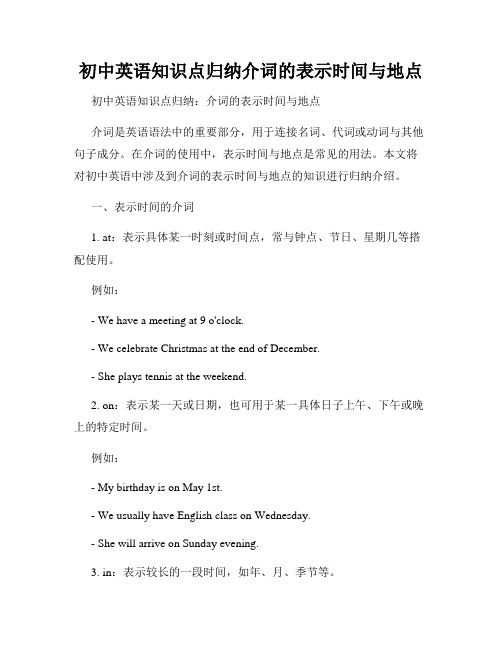
初中英语知识点归纳介词的表示时间与地点初中英语知识点归纳:介词的表示时间与地点介词是英语语法中的重要部分,用于连接名词、代词或动词与其他句子成分。
在介词的使用中,表示时间与地点是常见的用法。
本文将对初中英语中涉及到介词的表示时间与地点的知识进行归纳介绍。
一、表示时间的介词1. at:表示具体某一时刻或时间点,常与钟点、节日、星期几等搭配使用。
例如:- We have a meeting at 9 o'clock.- We celebrate Christmas at the end of December.- She plays tennis at the weekend.2. on:表示某一天或日期,也可用于某一具体日子上午、下午或晚上的特定时间。
例如:- My birthday is on May 1st.- We usually have English class on Wednesday.- She will arrive on Sunday evening.3. in:表示较长的一段时间,如年、月、季节等。
例如:- I was born in 2005.- He will go to Canada in the summer.- They always go skiing in January.4. during:表示在某一段时间内。
例如:- I read a book during the summer vacation.- They have a party during the New Year's holiday.5. for:表示持续的一段时间。
例如:- I have been learning English for five years.- They will stay in the hotel for a week.二、表示地点的介词1. in:表示在一个较大的范围或区域内。
精华版+in,+at,+on表时间的用法

介词in,on与at表时间的用法at < 天(eg. noon, dawn, night, one’ clock)on = 天(Monday, 30th June, New Year’s Day, Mother’s Day)in > 天(2008, summer, April, 还有早午晚)用in的场合后所接的都是较长时间(1)表示“在某世纪/某年代/特定世纪某年代/年/季节/月”这个含义时,须用介词inEg: This machine was invented in the eighteenth century. 这台机器是在18世纪发明的。
This incident happened in the 1970s. 该事件发生在20世纪70年代。
She came to this city in 1980. 他于1980年来到这个城市。
It often rains here in summer. 夏天这里常常下雨。
(2)表示“从现在起一段时间以后”时,须用介词in。
(in+段时间表将来)Eg: They will go to see you in a week. 他们将在一周后去看望你。
I will be back in a month. 我将在一个月后回来。
(3)泛指一般意义的上、下午、晚上用in, in the morning / evening / afternoonEg: They sometimes play games in the afternoon. 他们有时在下午做游戏。
Don't watch TV too much in the evening. 晚上看电视不要太多。
(4)A. 当morning, evening, afternoon被of短语修饰,习惯上应用on, 而不用in.Eg: on the afternoon of August 1st(5)B. 但若前面的修饰词是early, late时,虽有of短语修饰,习惯上应用in, 而不用on.Eg: in the early morning of September 10th 在9月10的清晨;in the late afternoon of September 12th 在9月12日的傍晚。
介词表示时间的7个用法
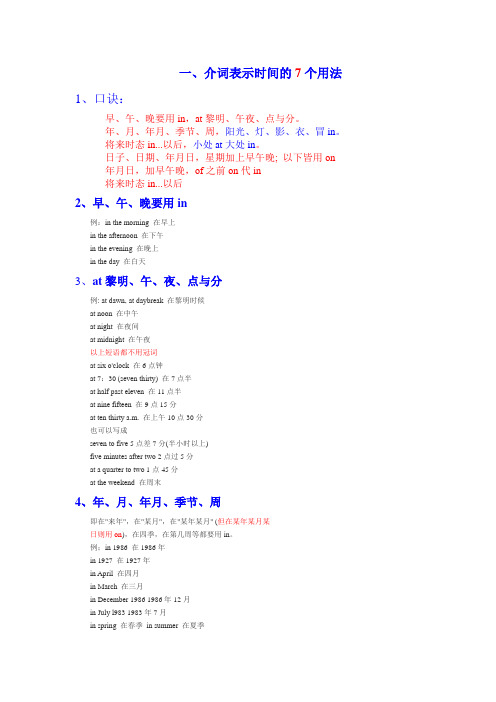
一、介词表示时间的7个用法1、口诀:早、午、晚要用in,at黎明、午夜、点与分。
年、月、年月、季节、周,阳光、灯、影、衣、冒in。
将来时态in...以后,小处at大处in。
日子、日期、年月日,星期加上早午晚; 以下皆用on年月日,加早午晚,of之前on代in将来时态in...以后2、早、午、晚要用in例:in the morning 在早上in the afternoon 在下午in the evening 在晚上in the day 在白天3、at黎明、午、夜、点与分例: at dawn, at daybreak 在黎明时候at noon 在中午at night 在夜间at midnight 在午夜以上短语都不用冠词at six o'clock 在6点钟at 7:30 (seven thirty) 在7点半at half past eleven 在11点半at nine fifteen 在9点15分at ten thirty a.m. 在上午10点30分也可以写成seven to five 5点差7分(半小时以上)five minutes after two 2点过5分at a quarter to two 1点45分at the weekend 在周末4、年、月、年月、季节、周即在"来年",在"某月",在"某年某月" (但在某年某月某日则用on),在四季,在第几周等都要用in。
例;in 1986 在1986年in 1927 在1927年in April 在四月in March 在三月in December 1986 1986年12月in July l983 1983年7月in spring 在春季in summer 在夏季in autumn 在秋季in winter 在冬季in the fist week of this semester 这学期的第一周in the third week 在第三周5、日子、日期、年月日,星期加上早午晚; 以下皆用on。
精华版-in--at--on表时间的用法
介词in,on与at表时间的用法at < 天(eg. noon, dawn, n ight, one’ clock)on = 天(Monday, 30th June, New Year’s Day, Mother’s Day)in > 天(2008, summer, April, 还有早午晚)用in的场合后所接的都是较长时间(1)表示“在某世纪/某年代/特定世纪某年代/年/季节/月”这个含义时,须用介词in Eg: This machine was invented in the eighteenth century. 这台机器是在18世纪发明的。
This incident happened in the 1970s. 该事件发生在20世纪70年代。
She came to this city in 1980. 他于1980年来到这个城市。
It often rains here in summer. 夏天这里常常下雨。
(2)表示“从现在起一段时间以后”时,须用介词in。
(in+段时间表将来)Eg: They will go to see you in a week. 他们将在一周后去看望你。
I will be back in a month. 我将在一个月后回来。
(3)泛指一般意义的上、下午、晚上用in, in the morning / evening / afternoon Eg: They sometimes play games in the afternoon. 他们有时在下午做游戏。
Don't watch TV too much in the evening. 晚上看电视不要太多。
(4)A. 当morning, evening, afternoon被of短语修饰,习惯上应用on, 而不用in.Eg: on the afternoon of August 1st(5)B. 但若前面的修饰词是early, late时,虽有of短语修饰,习惯上应用in, 而不用on.Eg: in the early morning of September 10th 在9月10的清晨;in the late afternoon of September 12th 在9月12日的傍晚。
全面、清晰的in、on、at的时间用法和地点用法
in,on,at的时间用法和地点用法在英语中介词的使用频率比较高,而介词in, on和at 又是介词中使用频率比较高的词。
一、介词in,on和at时间用法1、in的时间用法1)、在某个较长的时间(如世纪,朝代,年,月,季节,及泛指的上午,下午和晚上等,假期)内。
①在泛指的上午、下午、晚上前。
如:in the morning,in the afternoon,in the evening,in the early morning在大清早②在年、月、季节前.如:in 2008,in August,in summer,in spring在春天,In June在六月,in June,2010在2010年六月,He was born in 1942.③在假期、在某段时期内in the holidays,in one's youth,in one’s spare time在某人业余时间,in my free time 在我空闲时,in one’s childhood在童年,in recent years,in course of , in the future 在将来,in future 从今以后=from now on,in the past,in my teens在我十几岁时,in his eighties在他八十多岁时,in a day or two在一两天,in those days在当时,in the old days在过去的日子里,in a month/year在一个月/一年里(在将来时里翻译成一个月或一年后)④在世纪、朝代、年代前In the 20th century,in the 21st century (除了1st,2nd,3rd 以外,其他序数词以th结尾),in the eighties 在八十年代,in the 1990s或in the 1990’s在九十年代2)、在一段时间in a month/year在一个月/年里(在将来时里翻译成一个月/年之后)in the day(time)在白天,可换成duringin my childhood在我的童年里in my free/leisure time在我空闲时,in可换成during,也可以写成at leisure在空闲时.He will come round in a day or two。
表示时间的介词用法
【in】我是“大姐”,因为我后面所接的都是较长时间。
具体用法有:1.表示在较长的时间里(如周/月份/季节/年份/世纪等)。
如:in a week;in May; in spring/summer/autumn/winter; in 2008;in the 1990’s等。
2.表示在上午、下午或晚上。
如:in the morning/afternoon/evening。
3. in the daytime(在白天)属于固定搭配,指从日出到日落这一段时间,反义词组是in the night。
4. “in +一段时间”表示“多久以后/以内”,常与将来时连用。
如:in half an hour;in ten minutes;in a few days等。
【on】我是“二姐”,我后面所接的时间多与日期有关。
具体用法有:1.表示在具体的某一天(如日期、生日、节日或星期几)。
如:on May 4th,1919; on Monday;on Teachers’ Day;on my birthday;on that day等。
2.表示某一天的上午、下午或晚上。
如:on the morning of July 2; on Sunday afternoon;on a cold winter evening等。
【at】我是“小妹”,因为接在我后面的时间最短。
具体用法有:1.表示在某一具体时刻,即几点几分。
如:at six o’clock;at half past nine;at a quarter to six;at this time等。
2.表示在某一短暂的时间。
如:at noon;at this moment;at the end of a year;at the start of the concert等。
68|评论(25)按默认排序|按时间排序其他回答 共5条2011-07-17 07:55fanrong1229|十四级1、介词on用在时间上,表示某一具体的时间前面(常表达某一天),如:on Sunday morning , on july , 25.2、介词in用在时间上,表示在某一特定时间里,或者某段时间之后,如:in the morning, in a week.3、介词at用在在时间上,是用某一点时间前面,如:at six o'clock.[提问者认可]|25|评论(5)2010-11-15 19:10祝小明也|来自手机知道|三级on Christmas . in Spring Festival3|评论2011-07-17 04:36diepen95|六级关于时间: in,at,on in the morning/eveningin front of:在……前面(in front of me)物体介词后面全宾格…… 还有啥的想不到了……2|评论(1)检举|2011-07-17 05:32palmaking|十七级记住,以下内容对中考和高考非常有用,要仔细阅读和背出来:in Januaryin winterin 1999;in the morning/ afternoon /evening.in the daytimeon Monday,on Sunday afternoon,on July 1st, 2011at six o’clock,at three thirty.at night,at noon,at this time of year.in a yearin springin Septemberin a week ,in two weeksin two weeks' timeon Mondayon Monday afternoonon March 7th, 2000at eight o’clockat this time of day /yearat the momentin the summer / winter holidayat Christmason Christmas Day / Eve / afternoonon the evening of May 31st,2011on National Dayon Children's Dayon the day of my arrival / departureon the day she comesin the year I was bornon the very Monday she fell illon Thanksgiving Dayduring our stay in Japanin Tom's absencein the presence of my friendson our way to the libraryon their first trip to Shanghaion a voyage inthe Atlantic Ocean。
新概念二语法:表时间的介词at、on、in的用法
【导语】新概念英语作为家喻户晓的英⽂学习教材,《新概念英语》在中国经久不衰,影响了好⼏代学习者。
即使以今天的⾓度来看,这套出版于⼏⼗年前的教材⽆论是在编排体系,题材和题材,词汇还是语法上都有出彩之处,值得各个层次的⼈学习。
⽆忧考为您整理以下内容,希望可以帮助到您! ⼀、at 1、表⽰时刻,即⼏点⼏分(with particular points on the clock) I’ll see you at five o’clock. (我五点和你见⾯。
) 2、表⽰⼀天中的某个时间段(with particular points in the day) The helicopter took off at midday and headed for the island. (直升机中午起飞,飞往那个岛屿。
) 3、表⽰⼀周中的某个时间段,即⼯作⽇(weekday)和周末(weekend)(with particular points in the week) What are you doing at the weekend? 4、表⽰某种特殊场合,如名字中不含day的节假⽇(with special celebrations) At the New Year, millions of people travel home to be with their families(到了新年,成百上千万的⼈会回到家⾥和家⼈团聚。
) 例外情况:如果是说在⽣⽇那天,不⽤at,⽽⽤on,因为⽣⽇那天是指具体⽇期,请往下参考on的⽤法。
【注意】 如果是⽤what time来提问,what time前⾯⼀般不⽤at。
如:What time are you leaving? (你⼏点⾛?) 但是在⼝语中也可以这么问:At what time are you leaving? ⼆、on 1、⽤在⽇期前(with dates) We moved into this house on 2 October 1997. (我们是1997年10⽉2⽇搬进这栋房⼦的。
- 1、下载文档前请自行甄别文档内容的完整性,平台不提供额外的编辑、内容补充、找答案等附加服务。
- 2、"仅部分预览"的文档,不可在线预览部分如存在完整性等问题,可反馈申请退款(可完整预览的文档不适用该条件!)。
- 3、如文档侵犯您的权益,请联系客服反馈,我们会尽快为您处理(人工客服工作时间:9:00-18:30)。
at, in, on, by和through在表示时间上的区别
at, in, on, by和through在表示时间上的区别
1. at指时间表示:
(1)时间的一点、时刻等。
如:
They came home at sunrise(at noon, at midnight, at ten o’clock, at daybreak, at dawn).(2)较短暂的一段时间。
可指某个节日或被认为是一年中标志大事的日子。
如:He went home at Christmas(at New Year, at the Spring Festival, at night).
2. in指时间表示:
(1)在某个较长的时间(如世纪、朝代、年、月、季节以及泛指的上午、下午或傍晚等)内。
如:
in 2004, in March, in spring, in the morning, in the evening, etc
(2)在一段时间之后。
一般情况下,用于将来时,谓语动词为瞬间动词,意为“在……以后”。
如:
He will arrive in two hours.
谓语动词为延续性动词时,in意为“在……以内”。
如:
These products will be produced in a month.
注意:after用于将来时间也指一段时间之后,但其后的时间是“一点”,而不是“一段”。
如:
He will arrive after two o’clock.
3. on指时间表示:
(1)具体的时日和一个特定的时间,如某日、某节日、星期几等。
如:
On Christmas Day(On May 4th), there will be a celebration. (2)在某个特定的早晨、下午或晚上。
如:
He arrived at 10 o’clock on the night of the 5th.
(3)准时,按时。
如:
If the train should be on time, I should reach home before dark.。
